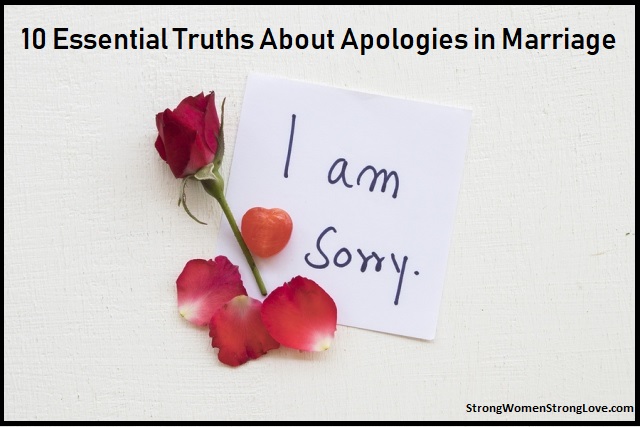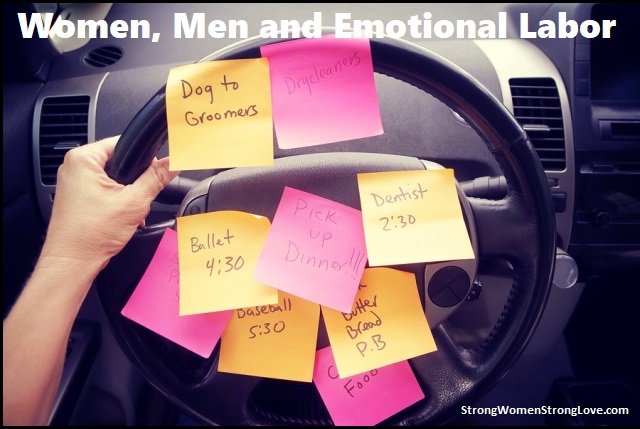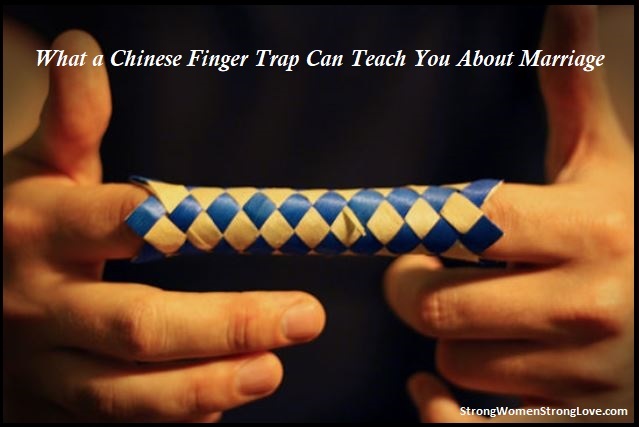by Strong Women Strong Love | Apr 1, 2018 | Books, Passionate Partnership |

In my last post, I talked about the importance of repair in your relationship. All couples go through conflicts, misunderstandings, and hurt feelings, and it’s very important to resolve them.
One of the tools you need in your relationship repair kit is the ability to give and accept an apology. Apologies are so important that renowned psychologist and relationship expert Harriet Lerner devoted an entire book to the subject: Why Won’t You Apologize? Healing Big Betrayals and Everyday Hurts. This book is required reading for strengthening your marriage, not to mention all the other relationships in your life.
Adapted from Lerner’s work, here are 10 essential things you should know about apologies:
- Apologizing well requires listening deeply to the person you hurt. Your apology should begin by fully understanding their feelings and experience, no matter how difficult they are for you to hear.
- A good apology also requires taking responsibility. A hurt person wants you to carry some of the pain of the situation with him. She also needs assurances that the same situation won’t happen again.
- A bad apology can make things worse than no apology at all.
- Common mistakes people make when apologizing include: making excuses, over-explaining, blaming the other person for your mistake, and bringing up things the other person did wrong in the past.
- A consistent failure to apologize harms a relationship, even if things are otherwise good. When both partners have the ability to apologize, the relationship is stronger and healthier.
- An apology doesn’t have to be the last word on a situation. Think of it as opening the door to future communication.
- In situations where the hurt runs very deep, an apology isn’t a one-time event. At these times, you must commit to ongoing listening and repair of your relationship.
- Apologizing when you’ve caused deep harm requires a strong sense of your own self-worth. Without it, you’re more likely to be defensive by doing things like minimizing, rationalizing and denying the pain you have caused.
- If your partner fails to apologize to you, that’s typically an indication of his low self-worth, not that he doesn’t love you.
- You don’t have to rush to forgiveness after an apology. In fact, doing so can cut short your healing process. Forgiveness also doesn’t have to be total for your relationship to move past the issue.
I encourage you to be quick to offer sincere apologies to your husband. Also, be receptive to his sincere efforts to make amends. If either partner’s failure to apologize is a trouble spot in your marriage, make it a priority to explore Lerner’s work together.
by Strong Women Strong Love | Mar 18, 2018 | Poisonous Patterns |

All relationships are different. But I can tell you one thing for certain about yours: Both you and your husband have messed up at one time or another. And both of you will again.
That doesn’t mean your marriage is bad. It just means that you are two human beings in a relationship. The important thing is what happens after you’ve messed up.
Choose the Right Tools
You might remember that we’ve talked before about the work of the Gottman Institute. From his studies of married couples, Dr. John Gottman identified behaviors that separate the Masters of Marriage (couples who have been married for a long time and still like each other) and the Disasters of Marriage (those headed for divorce).
Gottman discovered that one of the most important qualities of a strong couple is the ability to address and recover from conflicts, hurts and mistakes. Gottman calls this process repair. And a repair attempt is “any statement or action – silly or otherwise – that prevents negativity from escalating out of control.”
A meaningful apology is one of the most valuable tools in your relationship repair kit. But it’s not the only one. Other examples of repair attempts include:
- Asking to start a conversation over if it seems like the two of you aren’t hearing each other.
- Suggesting taking a break so you can both get to a calmer place.
- Being physically affectionate or reassuring.
- Using humor or trying to lighten things up.
The best repair attempt to use with your partner — or for him to use with you — depends on your individual needs. Maybe, for example, physical affection instantly starts repairing a conflict for you, but it feels too emotionally intense for him until you both get a calmer place. The Gottman Institute has a repair checklist that I recommend talking about together before the next time the two of you need to practice relationship repair. The list will help each of you understand which repair attempts the other responds to.
Maintenance Is Important Too
Making effective repair attempts is only part of the equation, though. The real measure of how well you can navigate trouble spots in your relationship is how receptive you are to connecting with each other on a regular basis. Gottman has found that the Masters are responsive to their partner’s attempts to communicate or connect about 86% of the time, while the Disasters group only responds about 33% of the time! If the door to connecting is closed most of the time, it’s even harder to open when you are having trouble.
It is critical to pay attention to the overall emotional climate of the marriage. I’ve written before about why regular maintenance is essential for your marriage, and this is one more reason. When the two of you are regularly kind, respectful and appreciative with each other, it makes sense that you’ll be more open to repairing your relationship when things go awry.
To sum it all up, here’s a quick “maintenance and repair guide” for your marriage.
- Establish a strong foundation by having positive interactions with each other daily.
- Understand the repair attempts that you and your husband respond to.
- Be generous in making repair attempts when you hit a trouble spot.
- And be generous in accepting your husband’s repair attempts.
In my next blog article, we’ll continue to build your skills in healing both small and large rifts in your marriage. I’ll go into more depth on making, and accepting, apologies. In the meantime, you can get more strategies for building a marriage that can withstand conflicts in my book Strong Women, Strong Love.
by Strong Women Strong Love | Mar 4, 2018 | Persistent Pressures, Understanding Men |

In my last blog post, on emotional labor, I cited the work of renowned couple’s therapist, speaker and author Terry Real. Real’s work is important, and it has the potential to change your marriage, so I wanted to tell you more about him.
A great starting point is the post “The Awful Truth: Most Men Are Just Not Raised to be Intimate” on Real’s website. It’s a case study about his work with a couple during a two-day therapy session aimed at saving their marriage.
This is an intense read. The couple, Peter and Jenn, struggle with problems that affect many marriages. Their early passion for each other has fizzled. She’s tired of trying to build intimacy, while Peter seems incapable of it. He feels she’s undercutting his authority with their children, while she worries about his toxic temper, especially with their son. To top it all off, Peter has also been unfaithful.
Take a few moments to read and reflect on this case study. As you do, here are a few key points I especially want you to take to heart.
- In our culture, we still raise boys to be “hard, logical, independent and stoic,” as Real says. This creates men who are “emotionally distant, arrogant, numb to their own feelings and unconcerned about everyone else’s, as well as contemptuous of vulnerability and weakness.” Real points out something else important here: Men who were raised this way are the norm, not an aberration, especially when we look at older generations.
- It might be easy to interpret Real’s work as man-bashing, but that’s not accurate. He emphasizes that men struggle with intimacy not because they’re bad people, but because of the way they were raised and cultural messages. Real believes that, with hard work and bravery, men can change what they bring to relationships. He’s been through such a transformation himself.
- Real is not saying that women are perfect. In this case study, he’s clear that Jenn has her own issues to address, but that the most urgent need is for Peter to make changes.
- Real believes that what looks like men’s fear of intimacy is really the fear of subjugation. “Many men read emotional receptivity as an invitation to be run over,” Real says. This comes from raising men with an overemphasis on being strong and competitive.
- Nurturing and understanding, whether from their partners or through therapy, won’t change men like Peter. Instead, Real believes such men need to “feel proportionately ashamed for (their) bad behavior and yet still manage to hold onto (their) essential worth as an imperfect human being.” Appropriate shame isn’t spending the rest of your days in obsessive self-loathing. It’s about realizing who you have hurt and doing your best to make amends.
Real breaks from the common practice of the therapist not taking sides. “I side with the woman,” Real says. Again, he’s not against the man. He just believes that “business as usual” in therapy doesn’t work. This is because the skills and expectations men and women bring to a relationship can be extremely different.
If you’d like to delve further into Real’s work, there’s a great archive of articles on his website. You may also want to check out recent media coverage of Real in Forbes and AlterNet. To further your understanding of how your relationship is affected by the way you were both raised, enjoy this complimentary chapter on gender expectations from Strong Women, Strong Love.
by Strong Women Strong Love | Feb 18, 2018 | Persistent Pressures |

You and your husband may have discussed (or argued about) how you divvy up household chores and responsibilities. But have you ever talked about how the two of you divide the emotional labor that’s necessary to keep your relationship and your family functioning?
The term “emotional labor” has gotten a lot of buzz in the past few years, but it’s not new. Academics have been looking at the concept for decades. Inequity in who performs emotional labor is an issue in the workplace, in social situations and at home. But, since this is a blog about marriage, today I’m going to focus on emotional labor as it affects our domestic relationships.
Defining Emotional Labor
So what does emotional labor encompass? Writer Suzannah Weiss defines it this way:
Emotional labor is the exertion of energy for the purpose of addressing people’s feelings, making people comfortable, or living up to social expectations. It’s called “emotional labor” because it ends up using – and often draining – our emotional resources.
Of course, we all perform emotional labor in our relationships. The reason it’s such a hot-button topic, though, is that emotional labor at home disproportionately falls on women.
Emotional labor looks different in different households. But here are a few examples that might feel familiar to you:
- Your husband may be happy to go to parent-teacher conferences and other school events with you. But you’re the one who is primarily responsible for nurturing and meeting the emotional needs of your kids on a daily basis. You talk to them about conflicts with friends. It falls on you to make sure their birthday celebrations special. When you can, you volunteer at school so you will be seen as a good mother.
- Somehow it’s fallen on you to remember and send birthday/sympathy/graduation cards and gifts — even for his side of the family.
- You habitually monitor and manage your husband’s emotions, doing what you can to keep the peace.
- When you have guests, you’re anticipating their needs so they have a good visit. He simply enjoys himself.
- While your husband does chip in at home, you’re the one who’s constantly thinking ahead: We need to go ahead and book our vacation to get the best rates … If we want to host dinner on Saturday, we have to pick up groceries and clean up before then … If we want to sell the house next summer, we should start fixing it up now … Your mom is having trouble getting around. Let’s find someone to help her with chores.
Again, no one is saying that you shouldn’t perform tasks like these — or even enjoy performing them. The problem is that if you’re doing all of this type of work in your marriage, you’re going to end up depleted. That isn’t good for your health or the health of your relationship. When you’re exhausted and stressed, you’re likely to become resentful with your husband. And he may have no idea why.
Sharing the Emotional Load
Every couple could benefit from thinking and talking more about emotional labor. Try these ideas and insights to get started:
- First, realize that the emotional labor you do really is work. If you’re feeling tired and frazzled, it could be the constant emotional pressure you feel as you try to tend to everyone’s needs. Don’t wait until you explode. Ask for what you need from your partner.
- You may undervalue emotional labor because you’ve always prioritized other people’s emotional needs before your own. It’s important to acknowledge that constantly trying to keep others happy can be burdensome. It’s okay to put your needs first at times.
- Just because you’re better at emotional labor than your husband, doesn’t mean it should always fall on you. As writer Rose Hackman points out in The Guardian, we’d never accept this line of reasoning when it comes to, say, cleaning.
- If your husband isn’t taking on the emotional labor in your relationship, that doesn’t mean he’s a bad or incompetent person. Family therapist, speaker and author Terry Real reminds us of a disappointing truth: Almost universally, men don’t grow up learning how to be intimate partners. But that doesn’t mean they can’t become more skilled at emotional labor. Your marriage will certainly be stronger if you and your husband can learn how to share the job of nurturing and tending to the emotional needs of your loved ones and each other.
If this article has resonated with you, you and your husband may want to read my book Strong Women, Strong Love together. It’s a practical guide to maintaining a strong marriage amid our busy lives.
by Strong Women Strong Love | Jan 31, 2018 | Personal Power, Poisonous Patterns |

With Valentine’s Day coming up, are you looking for a romantic gift for your husband? I’ve got an unconventional idea for you.
Pick up a Chinese Finger Trap. Remember this tricky little toy from when you were a kid? If you do, chances are you also remember that the way out of the trap is counterintuitive. Once you have your fingers in the trap, pulling hard in opposite directions to get them out won’t work. The trap loosens only when you relax and gently slide your fingers out.
That’s actually a great metaphor for the relationship patterns we can find ourselves stuck in. You know how it goes: One partner habitually does something and the other always has the same knee-jerk reaction. The same old back-and-forth leads to the same old fights.
Just as with the finger trap, the only way to escape relationship traps is to pause before you engage in your familiar, instinctive reactions. Relax and ease into doing something different. Breaking the automatic pattern, gives you the power to make a deliberate choice about what you want to do next.
The Chinese Finger Trap may not seem like the most romantic gift, but it can be a gentle visual reminder of the power of being thoughtful and calm in your relationship, rather than fighting furiously when your buttons are pushed.
Want to learn more about breaking out of relationship traps? You may enjoy my past blog articles on chasing and complaining, two common destructive patterns that can also keep you trapped.






